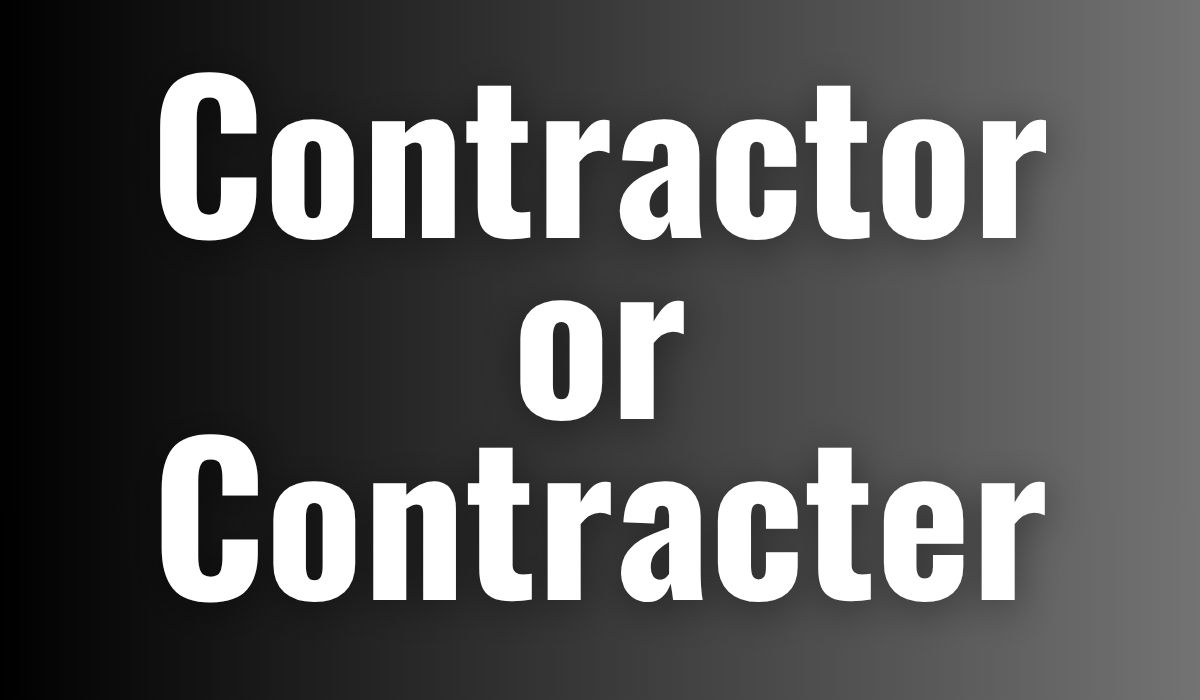Language can be tricky, and one common confusion many writers face is “Contractor or Contracter.” If you’ve ever hesitated while typing this word, you’re not alone. The truth is simple: “Contractor” is the correct spelling, while “Contracter” is a common mistake.
In this guide, you’ll learn what contractor really means, why contracter is incorrect, how to use the right form in writing, and even how to remember it for good. Let’s clear up this confusion once and for all.
The Correct Word “Contractor” Explained
A contractor is a person or company hired to perform work under a contract. It could be a construction firm, a freelancer, or even a software developer. The term comes from the Latin root “contractus”, meaning drawn together or agreed upon.
Definition (Oxford Dictionary):
“A person or firm that undertakes a contract to provide materials or labor to perform a service or do a job.”
Common Fields Where “Contractor” Is Used:
- Construction industry: general contractor, building contractor
- Technology: IT contractor, independent contractor
- Government: government contractor
- Freelance work: freelance contractor or consultant
These real-world examples show that contractor applies to anyone entering a legal or professional agreement to complete a task.
What About “Contracter”?
So, is “contracter” a word? The short answer is no. It’s a misspelling that likely appears because many English words end with “-er” (like teacher, writer, or builder).
However, “contracter” does not appear in any major English dictionary — not Oxford, Merriam-Webster, or Cambridge. It’s simply a common misspelling of “contractor.”
| Word | Meaning | Correct Usage |
| Contractor | A person/company bound by a contract | ✅ The contractor completed the project on time. |
| Contracter | ❌ Incorrect spelling, not recognized | 🚫 The contracter finished the job. |
Why People Confuse “Contractor” and “Contracter”
Many people confuse these words because of suffix patterns in English. Both “-or” and “-er” endings sound similar but have different origins.
Here’s a quick comparison:
| Ending | Examples | Meaning/Origin |
| “-er” | teacher, writer, builder | Used for people performing actions (verb + er) |
| “-or” | actor, inventor, contractor | From Latin-origin nouns denoting professions |
Fact: In words derived from Latin, “-or” is almost always the correct ending (e.g., actor, editor, creator, contractor). This pattern helps you remember that “contractor” (with -or) follows the same logic.
Correct Usage of “Contractor” in Sentences
Let’s look at how the correct form works in real-world contexts.
| Context | Correct Example | Incorrect Example |
| Business | The contractor signed the agreement to build the office. | The contracter signed the agreement. |
| Freelance | She’s working as a freelance contractor for several startups. | She’s a freelance contracter for startups. |
| Legal | The contractor’s responsibility is stated in the clause. | The contracter’s responsibility is stated. |
| Construction | A general contractor manages multiple subcontractors. | A general contracter manages projects. |
Pro tip:
Always proofread your documents or use grammar tools to catch these errors — especially in contracts, proposals, or resumes.
Types of Contractors You Might Encounter
Understanding the different types of contractors helps you use the word in the right context.
- General Contractor – Manages entire construction projects.
- Subcontractor – Works under a general contractor on specialized tasks.
- Independent Contractor – Self-employed; provides services to clients (like a designer or IT consultant).
- Government Contractor – Provides goods/services to public agencies.
- Freelance Contractor – Works remotely or part-time for multiple clients.
Each of these roles shares the same correct spelling: contractor — never “contracter.”
The Importance of Correct Spelling in Professional Writing
Using “contracter” instead of “contractor” might seem like a small mistake, but in business and legal settings, it can hurt your credibility.
A single typo on a resume, proposal, or contract can make your work appear unprofessional. Correct spelling communicates attention to detail and trustworthiness.
“Accuracy in language reflects accuracy in thought.” — Benjamin Disraeli
Case Study
In a 2023 LinkedIn study of 2,000 recruiters, 72% admitted they discard resumes containing obvious spelling errors. Using “contracter” instead of “contractor” could cost you a job or a contract.
“Contractor” in British vs American English
Both British and American English use the same spelling: “contractor.” There’s no regional variation — unlike words such as color/colour or organize/organise.
However, pronunciation might slightly differ:
- UK: /ˈkɒn.træk.tə/r/
- US: /ˈkɑːn.træk.tɚ/
So whether you’re in London or Los Angeles, the correct spelling stays the same.
Read More >>> CNC Meaning: What It Really Means in Internet Slang, TikTok
How to Remember the Correct Spelling
Try these easy tricks to remember contractor:
- Think of “contract + or” → the one who works under a contract.
- Link it with similar words ending in “-or” (actor, editor, inventor).
- Visualize this quick phrase:
“A contractor acts under a contract — just like an actor acts on a stage.”
Commonly Confused Words with “Contractor”
Don’t mix up contractor with these similar terms:
| Word | Meaning | Difference |
| Contractee | Person who receives the service | Opposite role of contractor |
| Contracture | Medical term (muscle shortening) | Unrelated to contracts |
| Builder | Worker who constructs buildings | A type of contractor, but not interchangeable |
FAQ
Is “contracter” ever correct?
No. “Contracter” is not a recognized word in English.
What is the plural of contractor?
Contractors. Example: Independent contractors provide specialized services.
Why is the word spelled with “-or” and not “-er”?
Because it comes from Latin-based word forms (like actor or inventor), which end in -or.
Can I use “contractor” in British and American English?
Yes, both dialects use “contractor.”
How do I use “contractor” in a sentence?
Our contractor completed the office renovation two weeks ahead of schedule.
Quick Recap — Contractor or Contracter
Let’s wrap it up:
| Correct | Incorrect |
| ✅ Contractor | ❌ Contracter |
- “Contractor” = right spelling
- “Contracter” = misspelling
- Used globally in business, legal, and professional contexts
- Both British and American English agree on “contractor”
Final Thoughts
The debate of Contractor or Contracter is easy to settle once you know the facts. Always choose “Contractor” — the only correct, professional, and dictionary-approved spelling.
Using precise language enhances your credibility, whether you’re a writer, freelancer, or business owner. Next time you sign a deal or send an email, remember:
A contractor works under a contract — and never under a misspelled one.








